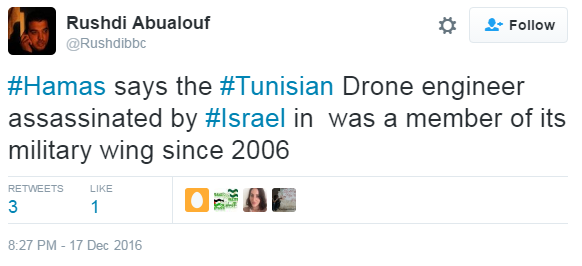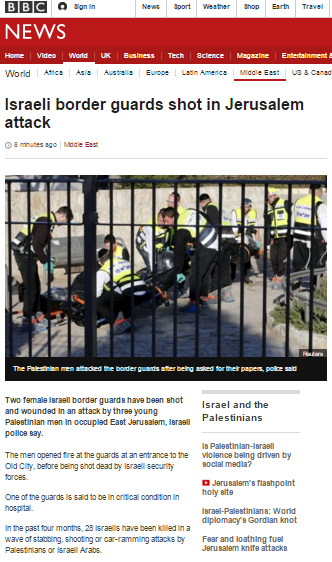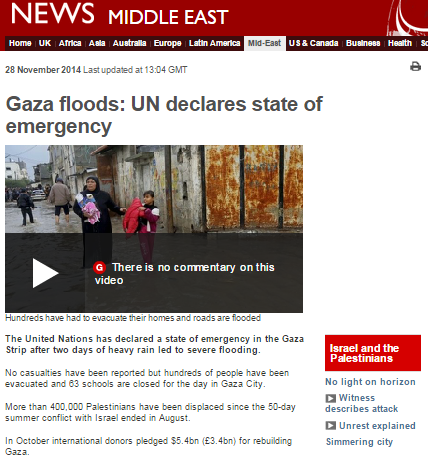On December 15th a man with links to organisations including Hamas and the Tunisian Muslim Brotherhood was murdered in the Tunisian city of Sfax. Local journalists quickly promoted the notion of Israeli involvement in the killing despite the absence of any supporting evidence.
“According to Channel 10, a senior Tunisian journalist said the Israeli spy agency Mossad had been tracking Zoari for quite some time, and was responsible for his assassination. […]
However, Channel 2 also quoted Tunisian security officials as saying that the investigation of the death did not currently suggest an assassination by a foreign intelligence agency.”
Another Tunisian official later commented on the case:
“A senior court official in Sfax, Murad a-Turki, said police had found two pistols, silencers and four cars apparently used in the killing.
“According to our initial investigation, we found a connection to other elements who are now outside the country,” he said.
Turki was quoted late Saturday saying that there was no evidence linking Israel to the death. He also said there were eight suspects in custody, most of them Tunisian citizens. One of those in custody was said to be a Tunisian journalist based in Hungary. Two other suspects, one a Belgian of Moroccan origin, were still being sought.” [emphasis added]
Nevertheless, on December 17th Hamas put out a statement blaming Israel for the murder.
“Qassam Brigades mourns the martyr of Palestine, martyr of the Arab and Muslim nation, the Qassam leader, engineer and pilot Mohammad Zawari, who was assassinated by Zionist treacherous hands on Thursday in Sfax,” a statement posted on the group’s website said.
“The enemy must know the blood of the leader Zawari will not go in vain,” the statement said.
As Reuters noted in its report, “Hamas […] did not offer any evidence to support its accusation”.
That, however, did not prevent the BBC’s Gaza bureau employee Rushdi Abualouf from posting the following Tweet on the evening of December 17th:

Later the same night the BBC News website likewise found it appropriate to amplify Hamas’ speculations concerning a story it had previously ignored for well over 48 hours in an article headlined “Hamas accuses Israel of killing its Tunisian drone expert“.
“The Palestinian militant group Hamas has blamed Israel for the death of a Tunisian national it described as one of its drone experts.
Mohamed Zaouari, 49, was shot dead at the wheel of his car outside his home in Tunisia’s second city, Sfax, on Thursday.
The Qassam Brigades, Hamas’s armed wing, said he had worked for the “resistance” for 10 years.
It declared a day of mourning and vowed to avenge Mohamed Zaouari’s death.
Israel has not responded to the claims.”
BBC audiences had to read down to the article’s sixteenth paragraph (out of a total of 19) to discover that:
“Hamas has offered no proof of its claims that Israel was behind the murder…”
The article also included an insert under the sub-heading “Hamas’s relationship with Israel” which (not for the first time) amplifies the Hamas narrative of ‘resistance’ while downplaying the group’s terror designations and airbrushing its record of terrorist activity.
“Hamas, which rules the Gaza strip, is seen as a legitimate resistance group by its supporters – but is classed as a terrorist outfit by the US and EU.
It refuses to recognise Israel as a country, and regularly fires rockets from Gaza into the Jewish state.
Israel has held Gaza under a blockade for the past decade, and conducted several offensives and air strikes against the territory – which it says are needed to curtail Hamas rocket fire.”
Although the Tunisian authorities’ investigation into the murder of Mohammed al-Zoari (also Zaouari or Zawari) is still ongoing, the self-styled “standard-setter for international journalism” has already steered its audiences around the world towards a version of events based entirely upon the evidence-free speculation of a terrorist organisation.
Particularly in the current climate of discussion about ‘fake news’, that’s something to think about.
Related Articles:
BBC News website does ‘one man’s terrorist’




